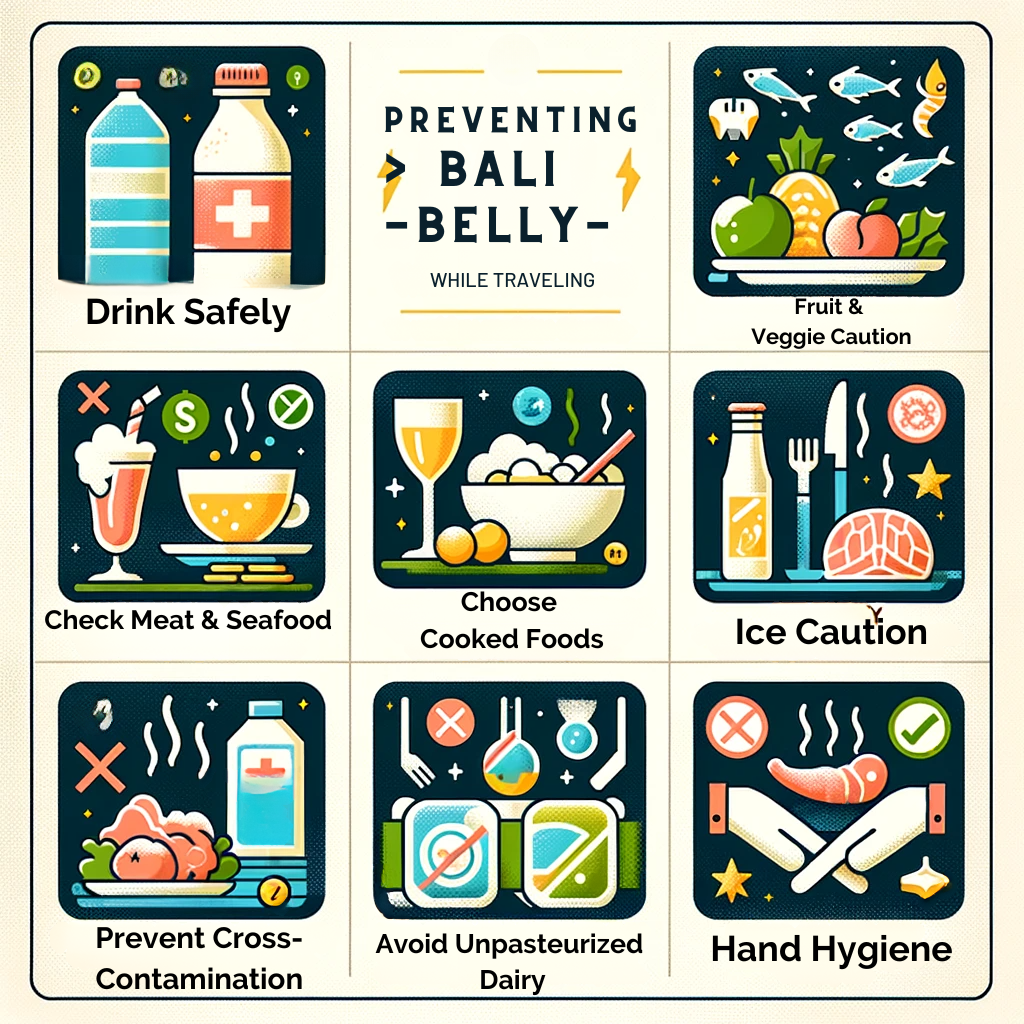What is Bali Belly?
Bali belly, also known as traveller’s diarrhea or Montezuma’s revenge, refers to a stomach and intestinal infection that is common among travelers to Bali, Indonesia. It is characterized by symptoms like diarrhea, abdominal cramps, nausea, vomiting, fever, and dehydration.
Bali belly is often caused by ingesting contaminated food or water containing pathogenic bacteria, viruses, or parasites. Common culprits include E. coli, Salmonella, Shigella, Campylobacter, Giardia lamblia, and Norovirus. The symptoms usually appear within 12-48 hours of ingesting contaminated food or water.
While Bali belly can happen anywhere, travellers to Bali are at a higher risk as hygiene standards for food and water may be lower than what they are used to back home. However, by taking some precautions, you can greatly reduce your chances of contracting this unpleasant travel companion.
Bali Belly Symptoms

The most common symptom of Bali belly is frequent, watery diarrhea that may be accompanied by abdominal cramps. Other possible symptoms include:
- Nausea and vomiting
- Fever and chills
- Dehydration
- Loss of appetite
- Bloating and intestinal gas
- Urgent need to defecate
- Bloody or mucus-filled stools (less common)
Symptoms can range from mild to severe. Mild cases may involve 3-5 loose bowel movements per day while severe cases can involve 10 or more watery stools per day. Symptoms typically last 2-5 days but can persist for 1-2 weeks without proper treatment.
Seek medical attention if you experience persistent vomiting, bloody diarrhea, high fever, or signs of dehydration like excessive thirst, dry mouth, dizziness, and dark urine.
Causes of Bali Belly
The most common causes of Bali belly include:
- Contaminated food and water: Consuming food or water contaminated with pathogenic bacteria, viruses or parasites. This includes raw or undercooked meat and seafood, unpeeled fruits and veggies, unpasteurized milk and dairy products, ice cubes, tap water, etc.
- Poor hygiene: Consuming food prepared or served without proper handwashing or that has been cross-contaminated from raw meat, seafood or waste.
- Bacteria: E. coli, Salmonella, Shigella, Campylobacter jejuni are some of the common culprits.
- Viruses: Norovirus and Rotavirus.
- Parasites: Giardia lamblia, Cryptosporidium, Entamoeba histolytica.
While contaminated food and water are the main causes, factors like stress, disrupted sleep cycles, and alcohol consumption can also increase susceptibility.
Is Bali Belly Contagious?
Bali belly is not contagious in the strict sense as you cannot catch it from an infected person through casual contact. However, the pathogens that cause it can spread through the fecal-oral route.
For example, if an infected person handling food does not wash hands properly after using the toilet, they can transmit the pathogens to others through the food. Likewise, if contaminated water comes in contact with food, it can spread the infection.
Maintaining good personal and food hygiene is crucial to prevent the spread of Bali belly causing pathogens.
How to Recover from Bali Belly?
Here are some tips for recovering from Bali belly:
- Rehydrate: Drink plenty of fluids like water, oral rehydration salts, weak tea, or broth to replenish lost fluids and electrolytes.
- Eat bland foods: Stick to the BRAT diet – bananas, rice, applesauce and toast. Avoid dairy, fatty, spicy or greasy foods till symptoms resolve.
- Rest: Get ample rest to allow your body to heal.
- Probiotics: Consume probiotic yogurt or supplements to restore gut microbiome balance.
- Medication: Consider OTC anti-diarrheal medications like Imodium or antibiotics if recommended by a doctor.
- Monitor: Watch out for signs of dehydration and persistent vomiting. Seek medical care if fever over 102°F.
Most cases resolve on their own within 3-5 days with adequate hydration and rest. Seek medical attention if symptoms persist beyond a week.
Natural Remedies for Bali Belly
Some natural remedies may help provide symptom relief for mild Bali belly:
- Ginger: Has antiemetic and antidiarrheal properties. Can help with nausea, vomiting and diarrhea. Take ginger tea, capsules or candied ginger.
- Probiotics: Help restore healthy gut flora. Consume probiotic yogurt, kefir or supplements.
- Apple cider vinegar: Has antibacterial properties. Add 1-2 tbsp to a glass of water and drink up to 3 times a day.
- Mint: Helps alleviate cramps and bloating. Drink mint tea or chew on fresh mint leaves.
- Turmeric: Has anti-inflammatory effects. Add to food, make turmeric tea or take curcumin supplements.
- Coconut water: Helps replenish electrolyte loss. Drink in moderation.
- Papaya: Contains the enzyme papain which eases digestion. Eat ripe papaya or take papaya enzyme supplements.
However, for severe cases, medical treatment may still be necessary. When in doubt, consult a doctor.
Travel and Bali Belly
Travelling in Bali can be an amazing experience but a case of Bali belly can certainly dampen your holiday spirit. Here’s what you need to know about dealing with it on your Bali trip.
How to Prevent Bali Belly While Travelling?

You can take some simple precautions to lower your risk of Bali belly while travelling:
- Only drink bottled water and avoid tap water. Check bottled water seals.
- Avoid raw fruits/veggies unless you can peel them yourself.
- Choose fully cooked hot foods. Avoid salads, buffets and street food.
- Check food is thoroughly cooked, especially meat and seafood.
- Avoid unpasteurized milk and dairy products.
- Don’t use ice in drinks as it may be made from tap water.
- Avoid cross-contamination by separating raw and cooked foods.
- Carry hand sanitizer and wash/sanitize hands before eating.
Following food and water hygiene precautions is key to preventing illness while travelling.
Travel Insurance Coverage for Bali Belly
It’s advisable to get travel insurance when visiting Bali. Confirm it covers gastrointestinal infections like Bali belly which can require doctor visits, medication, hospitalization, or trip interruption.
Most standard policies cover medical treatment for illnesses contracted during the trip. Some policies may exclude tropical diseases so check fine print for exclusions. Keep documentation like doctor bills to file claims later.
Seeking Medical Advice While Traveling in Bali
If you do get Bali belly, here are some tips for seeking medical help in Bali:
- Head to a major hospital in Denpasar, Kuta, Seminyak, Canggu or Ubud for treatment.
- Ask your hotel staff for help finding a reputable clinic or hospital.
- Contact your travel insurance provider for doctor recommendations.
- Consider telemedicine apps that connect you with an English-speaking doctor.
- Know key Indonesian medical terms and phrases for effective communication.
- Carry prescription medications and medical history to share with doctors.
Seek care if you have severe diarrhea, vomiting, fever or signs of dehydration.
Best Practices for Safe Travel in Bali
To stay healthy in Bali:
- Get travel vaccines and medications recommended for the region.
- Pack OTC medications, oral rehydration salts, probiotics.
- Research well-reviewed restaurants and hotels. Read recent reviews.
- Avoid crowded tourist spots with higher risk of contaminated food/water.
- Don’t wander barefoot on beaches or damp areas prone to parasites.
- Bring insect repellent and sun protection. Prevent mosquito bites.
- Follow food and water hygiene practices consistently throughout your trip.
Taking precautions will allow you to have a safe and enjoyable holiday in Bali.
Dealing with Bali Belly on Your Bali Holiday
If you do get sick:
- Stay hydrated with water, juices, electrolyte drinks.
- Opt for bland foods like rice, toast, crackers, chicken soup.
- Get ample rest and avoid strenuous activities.
- Carry medications, hand sanitizer and toilet paper with you.
- Stay close to your hotel if symptoms are severe.
- Consider seeing a doctor for persistent vomiting, bloody stools, dehydration or high fever.
- Don’t let Bali belly deter you from enjoying your holiday. The symptoms are temporary.
With some preparation and care, Bali belly can be managed and you can still have a great Bali vacation.
Dealing with Bali Belly
Bali belly can put a damper on your tropical vacation. Here are some effective ways to treat and get rid of this traveler’s woe.
Treatment Options for Bali Belly
- Oral rehydration solutions: Replenish lost fluids and electrolytes. Especially important for children and the elderly.
- BRAT diet: Eat bananas, rice, applesauce, and toast till symptoms resolve. Provides nutrition while giving bowels rest.
- Antidiarrheal medication: OTC medicines like loperamide (Imodium) and bismuth subsalicylate (Pepto-Bismol) can help control diarrhea and relieve cramps. Use judiciously.
- Antibiotics: For bacterial infections, doctors may prescribe antibiotics like Azithromycin or Ciprofloxacin. Complete the full course.
- Probiotics: Restore gut microbiome balance with probiotic supplements and foods like yogurt, kefir, kimchi.
- IV fluids: For severe dehydration, doctors administer IV fluids and electrolytes. Usually done in hospitals.
See a doctor if symptoms don’t improve in 3-4 days. Don’t take antibiotics without medical guidance.
Effective Ways to Get Rid of Bali Belly
To shorten duration and reduce severity:
- Stay hydrated with water, juices, broths, electrolyte drinks.
- Take probiotics to replenish healthy gut bacteria.
- Eat small, bland, low-fiber meals till symptoms resolve.
- Consider OTC anti-diarrheal medications for 1-2 days for symptomatic relief.
- Rest adequately and avoid strenuous physical activities.
- Maintain good hygiene like handwashing to prevent reinfection.
- Reduce stress and anxiety which can prolong recovery. Practice relaxation techniques.
- Seek medical care promptly if you have persistent vomiting, bloody stools or fever over 102°F.
With proper hydration and care, most cases resolve within 3-5 days. Seek medical help if symptoms don’t improve.
Maintaining Hydration and Nutrition with Bali Belly
Dehydration and malnutrition are concerns with severe Bali belly. To maintain hydration:
- Sip small amounts of water, oral rehydration solutions, diluted juices, broths frequently.
- Drink coconut water and eat watery fruits like watermelon to replenish electrolytes.
- Avoid alcohol and caffeinated drinks which can worsen dehydration.
- Watch out for dehydration signs like excessive thirst, dry mouth, dark urine, dizziness.
For nutrition:
- Prioritize bland foods like bananas, rice, applesauce, toast when appetite returns.
- Try mashed potatoes, boiled carrots, chicken soup – provide calories without irritating bowels.
- Take nutritional supplements if unable to eat adequate solid foods.
- Avoid fatty, spicy, gas-forming, and high-fiber foods till recovery.
Rehydration is key. Seek medical help if unable to keep fluids down due to persistent vomiting.
When to See a Doctor for Bali Belly
Consult a doctor promptly if you have:
- Diarrhea lasting more than 3 days without improvement
- More than 8-10 watery stools per day
- Persistent vomiting making it difficult to retain fluids
- Visible blood or mucus in stool
- Severe abdominal pain and cramps
- Fever over 102°F
- Signs of dehydration like dizziness, rapid heart rate, dark urine
- Recent antibiotic use as you may need alternate medication
- Compromised immunity or other medical conditions
- Travel in the next 36 hours as you may be unfit to fly
Don’t hesitate to seek medical care, especially if symptoms are severe. Better to be safe than sorry!
Preventing Bali Belly from Recurring
To avoid repeat episodes:
- Continue taking probiotics for 2-3 weeks after recovery to restore gut microbiome.
- When traveling again, adhere strictly to food and water precautions. Avoid risky foods.
- Ask your doctor about taking Dukoral vaccine prior to travel, it provides protection against E. coli.
- Pack oral rehydration salts and medications so you can self-treat mild cases.
- Learn from past mistakes – be vigilant about where you eat and what you eat.
- Don’t overindulge in alcohol or eat late at night, it increases susceptibility.
- Manage stress levels, get adequate sleep and avoid over-exertion during travel.
- Consider taking a course of antibiotics after your trip as a preventive measure.
Recurrence is common so don’t let your guard down. Be proactive in taking precautions and managing symptoms promptly. Seeking medical care early can help reduce severity and duration. With proper precautions, you can continue to enjoy travel to tropical destinations like Bali without Bali belly ruining your trip!

